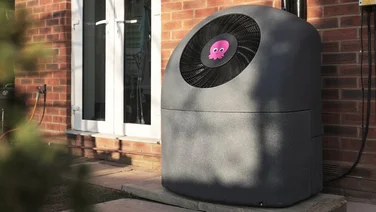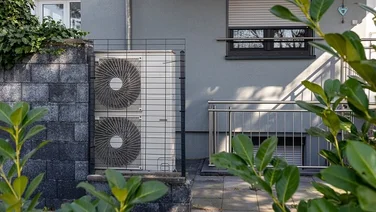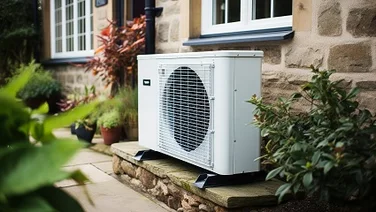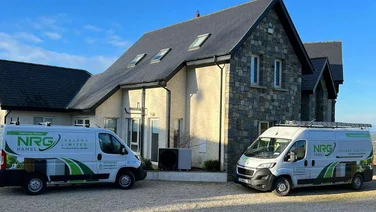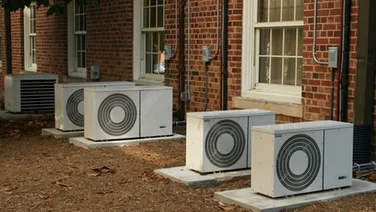- Heat pumps can reduce heating costs by 30–70%
- SEAI grants of up to €6,500 are available in Ireland for eligible properties
- Heat pumps are a versatile solution for year-round heating and cooling.

If you want to reduce your reliance on fossil fuels, and cut your carbon footprint with a highly-efficient heating and hot water system that runs on electricity, installing a heat pump is one of the most effective things you can do to futureproof your home.
While transitioning from a gas or oil boiler to a heat pump means making a significant investment in your home, the good news is, there is financial help available from the Irish government to help ease the burden of the upfront costs of doing so.
The Sustainable Energy Authority of Ireland (SEAI) offers grants of up to €6,500 toward the cost of a heat pump for eligible applications whose homes were built before 2021.
If we’ve piqued your interest, we recommend you read on to find out more, but if you want to get some quotes, simply fill out your details on this form, and our approved suppliers will be in touch.
How much do heat pumps cost in Ireland?
To get an understanding of how much a heat pump will cost for your home, let’s look at the different types of heat pump unit available.
Air source heat pump
Air-to-air heat pumps work by transferring heat from outside air to the inside of your home using dedicated outdoor and indoor units. The cycle is reversible and can also be used to cool your home.
Costs for units typically range from between €12,000–€18,000, depending on size, power rating and make.
Ground-source heat pump
As the name suggests, ground-source heat pumps ‘pump’ heat from the outside ground to heat or cool the inside of your home. Some can even be used to provide domestic hot water too.
These systems are typically more efficient than air-source heat pumps but require enough ground to install pipework. Costs for these systems are a little higher (as they also require groundwork) and typically range from between €17,000 and €28,000.
Water-source heat pump
These types of heat pumps use large bodies of water, such as lakes or rivers, to pump heat into your home. Like ground-source heat pumps, they can also be used to heat your hot water.
These are some of the most efficient heat pumps available, but they obviously require access to large bodies of water. Costs for these are similar to ground-source heat pumps, ranging from between €17,000 and €28,000.
Air-to-water heat pump
These forms of heat pumps are specialist air-source heat pumps, designed to heat wet central heating systems or domestic hot water.
Compared to ground- and water-source heat pumps, they are less labour-intensive to install but tend to be less efficient. The cost for these kinds of systems typically ranges between €12,000 and €18,000.
Interestingly, these kinds of systems tend to be the most popular in Ireland.
Are there any grants for heat pumps in Ireland?
If you are lucky enough to live on the Emerald Isle (and yes, heat pumps do work well in Ireland), grants are available for first-time heat pump installations and can cover various system types. There is a catch, however, as your home will need to be suitably well insulated to benefit, and replacement systems for homes with existing heat pumps are not eligible.
Homeowners and private landlords with properties built and occupied before 2021 (based on electricity meter installation date) can apply. Homes built before 2007 must have something called a technical assessment, while those built from 2007 onwards can either complete an assessment or submit a self-declaration form.

Both of these options are required to ensure the home is ready for efficient heat pump performance.
Don’t worry; you don’t need to fork out for the assessment (if needed) as you can also get your hands on a €200 grant to cover it, so long as it is conducted by an SEAI-registered advisor. Homes built after 2007 can also opt for an assessment but are not required to complete recommended upgrades.
That being said, a technical assessment, while optional, is recommended to optimise heat pump performance.
The amount of financial help you can get varies and depends on the type of heat pump system and dwelling. Most systems, including air-to-water and ground-source systems, provide €6,500 for houses and €4,500 for apartments. Air-to-air systems, which lack hot water functionality, offer €3,500 across all dwelling types.
Check out the SEAI’s dedicated page for more detailed information.
What are the main benefits of installing a heat pump in Ireland?
Here are some of the main benefits of installing a heat pump in Ireland:
Heat pumps are energy-efficient
One of the main benefits of installing a heat pump, especially in Ireland, is its unparalleled energy efficiency. Heat pumps consume electricity to transfer, or pump, energy from one location to another rather than directly change the temperature of a body of air like, say, an electrical heater.
This trick is performed through a combination of mechanical parts and a special chemical called a refrigerant. The physics is a bit more complicated than that, but needless to say, it is a very efficient way of doing it rather than the more “brute force” method of more traditional heating and cooling systems.
Installing a heat pump will reduce your carbon emissions
Because of their excellent energy efficiency (typically three or more hundred percent), heat pumps are, pound-for-pound, much better for the environment than conventional heating or hot water systems. Although heat pumps use electricity, they maximize efficiency by transferring heat rather than generating it, allowing them to provide more heating or cooling while consuming less energy overall.
Heat pumps can set themselves to the right temperature
Heat pumps come with sophisticated heating control systems and built-in thermostats to automatically maintain a set internal temperature. This means you need to set the thermostat how you like it, and the equipment will do the rest.
Some more sophisticated systems can even have fancy weather compensation features that enable them to become even smarter by constantly adjusting to external weather conditions all year round. Others can even “learn” about your habits and adjust to set your home’s temperature during those hours you are at home.
The same is true if your heat pump also provides hot water for your home.
Heat pumps work when it’s really cold outside
Because of how heat pumps work, they can provide heating and cooling all year around, even when it’s freezing cold outside. Many systems are designed to operate in conditions as low as -25°C, which is very popular in Northern European countries like Sweden, Finland, and Denmark.
If they are good enough for those northerly nations, they are more than up to the task of dealing with the weather in Ireland.
Government funding can help with the upfront costs
Installing heat pumps can be a costly affair, but thankfully, there are funding opportunities for Irish citizens interested in getting one. If your home was built before 2021, you may be eligible for the SEAI home energy upgrade grant, which can cover the costs of installing one in your home.
There is a catch here, however. Your home must meet minimum heat loss requirements, so you may need improve the energy efficiency of your home before being eligible. This could include the need to install solar PV, too, but there are grants for all that, too (if you are eligible, of course).
Summary
- Heat pumps are an efficient, eco-friendly solution for reducing heating and cooling costs, suitable for well-insulated Irish homes.
- Multiple types of heat pumps are available, including air, ground, and water-source systems, each with unique benefits and price ranges.
- Grants of up to €6,500 from SEAI can significantly offset installation costs, with additional funding available for technical assessments if needed.
- Heat pumps offer advanced controls, consistent performance in extreme weather, and a reduced environmental impact compared to traditional systems.
- For more information or to explore your options, check out SEAI’s resources and connect with approved suppliers to get started.


